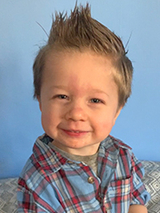New hospital will simplify families’ lives when kids need multiple surgeries
New hospital will simplify families’ lives when kids need multiple surgeries

At 10 months old, Emmalyn started walking. At 15 months old, she began tripping, losing her balance and sometimes falling badly. At this point, Emmalyn’s mother, Kayleigh, was pregnant. This second child would ultimately reveal why Emmalyn was having motor difficulties.
The first trimester screening for the child who would be named Carson showed several abnormalities, such as clenched fists — a possible symptom of Trisomy 18, a condition with no treatment that often causes death before birth. In an anxious search for a second opinion, the Lancaster County family turned to Children's Hospital of Philadelphia (CHOP). Kayleigh got an appointment at the Center for Fetal Diagnosis and Treatment and traveled to CHOP’s Main Campus for a day of extensive testing. The resulting diagnosis was arthrogryposis, which affects the range of motion of multiple joints, making them unable to fully extend or bend. There are different types of arthrogryposis and it is not a progressive disorder, so the symptoms can be countered with intense physical therapy and, in more severe cases, surgery.
Kayleigh met with B. David Horn, MD, an attending surgeon in the Orthopedic Center with a focus on congenital conditions affecting the feet, legs, hips and spine. “Because I was told it could be genetic, I brought Emmalyn with me so he could check her out,” says Kayleigh. “Right away, he said, ‘Oh yes, I know what she has.’” Emmalyn’s walking problems were due to congenital vertical talus in one foot, a rare condition that causes the toes and heel to curve up, making the middle of the foot touch the floor instead of arch upward. The condition can be associated with arthrogryposis. Genetic testing revealed that Emmalyn did indeed also have the condition, but it manifested itself differently than in Carson.
Juggling many visits and surgeries
Emmalyn underwent surgery the day before Carson was born. Horn loosened the tendons in her foot and also inserted a pin to correct her foot. After six weeks in a cast, she was fitted for a brace. As she grew, she needed follow-up surgery to again loosen the tendons.
Carson was delivered at CHOP’s Garbose Family Special Delivery Unit, and over the next eight months underwent several procedures. He was fitted for hand splints. Horn performed surgery on Carson’s club foot, which, as with Emmalyn, required follow-up procedures. Carson had an underdeveloped chin that caused severe sleep apnea, so Jesse A. Taylor, MD, Chief of the Division of Plastic, Reconstructive and Oral Surgery, inserted surgical distraction devices that slowly moved Carson's jaw into a position that allowed him to breathe more easily. His hands will also require surgeries to loosen tendons. Regular physical therapy sessions have made a big impact on his overall range of motion.
Emmalyn and Carson needed to go to CHOP’s Philadelphia Campus for their surgical procedures. For eight months after Carson was born, Kayleigh, Emmalyn and Carson stayed with Kayleigh’s parents in Lansdale, Pa., which is closer to Philadelphia than the family’s Ephrata home. Kayleigh’s husband, Cameron, visited on weekends. “It would have been nice to keep the family together,” says Kayleigh. “A trip to King of Prussia would have been a lot easier.” Indeed, many of the surgical procedures they underwent will be offered at CHOP’s King of Prussia hospital when it opens in fall 2021.

As Emmalyn, now 4, and Carson, 3, grow, they’ll likely need fewer interventions. But they’ve had considerable medical journeys already in their young lives. “They’re doing really good,” says Kayleigh. “Emmalyn has gotten used to going to the doctors. Carson has always been good with it.” The main trouble the family faces? A toddler’s dislike of shoes: “We have some trouble keeping their braces on — especially Emmalyn. She likes to be barefoot.”
When children need multiple surgeries, a family faces stressful logistical challenges. The advanced surgical suites at CHOP’s King of Prussia hospital will lessen burdens for the parents of kids like Emmalyn and Carson so they can remain focused on their children’s health and happiness.
Your support is crucial
Philanthropic contributions will allow us to build the kind of facility our patients deserve: Spaces that are conveniently located and welcoming for children and families. We invite you to invest in this meaningful endeavor to expand the reach of CHOP’s inpatient care.